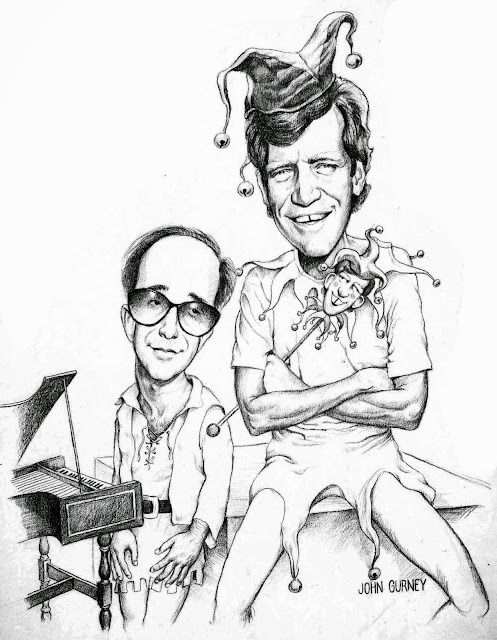Being a
freelance illustrator often means staying awake into the wee small hours to get
your work done. And for me, part of staying up late meant having David
Letterman as company, especially in the decades before Netflix streaming.
 |
| This caricature of Dave and Paul was in my portfolio back in the late eighties. |
As I
watched his last show I was awash in nostalgic feelings, and I’m not even sure
why because I haven’t really been watching the past couple years. Part of the
reason must be that the 33 years of his show being on the air has kind of
paralleled my time as an illustrator.
I was
one of the dozen or so people who watched his morning show that preceded Late
Night in the summer of 1980, right before I started at Pratt Institute. In 1982
when I heard he was getting a nighttime show after Johnny Carson I remember
telling my roommates that we should check it out. Almost instantly the show
became an integral part of staying up late and getting work done.
David
Letterman’s sensibilities influenced my generation’s humor and perspective in
the way that Monty Python and Saturday Night Live had a few years earlier.
Phrases like “we all know how painful THAT can be” and “no wagering please”
would pepper our speech, replacing “this parrot is most definitely dead” and “We
are two wild and crazy guys!”
Dave
gave us permission to view the hip and the avant garde with detached irony. But
was he a regular guy chuckling at the pretentious elite? Or was he an elitist
himself? I used to love it when Harvey Pekar, the underground graphic novelist
came on the show. Dave and he would get into verbal sparring matches, and Pekar
came off looking like an eccentric lunatic. In recent years I’ve discovered Pekar’s
work and grown to appreciate his writing. Now when I watch those old interviews
on Youtube Dave seems like a frat boy being really condescending to an
alienated nerd.
In a
strange way that’s another aspect of the show that I relate to. Before I
embarked on illustrating 140 chapter books I thought social satire would be my illustration
niche. I wanted (and still want) my illustrations to be funny, but not
sarcastic. Social satire is at its best when it’s pointing out something that
we recognize in ourselves (and laugh at), rather than pointing at, and putting
down, in someone else. I think Dave aspired to that too. True, he often fell
short and came off as sarcastic. And if his humor was condescending at times,
he was self deprecating in equal measure. But I think it’s remarkable how often his humor
hit the perfect mark, insightful but never sentimental.
 |
| Older Dave |


No comments:
Post a Comment